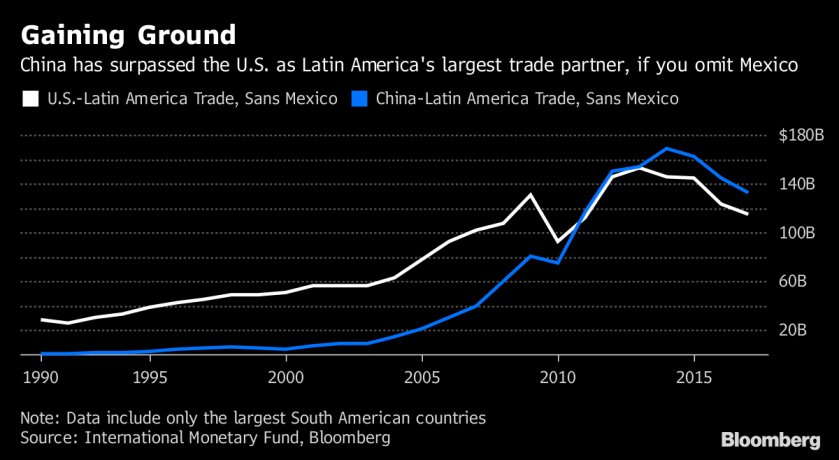Perché la Cina sta vincendo : forse perché pensa e lavora per ottenere risultati a medio termine
Giuseppe Sandro Mela.
2018-01-15.

Con il Progetto Belt & Road la Cina si sta assicurando un ottimo rapporto politico ed economico con i paesi dell’est Europa, che scambiano ore più merci con la Cina che non con l’Unione Europea, con i paesi asiatici, ove il suo progetto ferroviario le assicura tra l’altro sbocchi sicuri sugli oceani, e con l’Africa, i cui stati stanno abbandonando i rapporti con l’Occidente perché condizionati troppo pesantemente da imposizioni etiche e sociali per loro inaccettabili.
Adesso la Cina sta finendo l’accerchiamento dell’Occidente penetrando in profondità i sistemi economici dell’America Latina.
Basterebbe osservare con cura un mappamondo per notare come la Cina abbia accerchiato l’Occidente, che alla fine commercerà solo con sé stesso: troppo poco per vivere.
*
«China in 2009 surpassed the U.S. as Brazil’s largest export market, as South America’s biggest economy stepped up shipments of everything from iron ore to soy beans»
*
«China a year later become Latin America’s leading trade partner, when you omit Mexico and take into account only the South American nations»
*
«China’s emergence as a global economic rival to the U.S. is perhaps most obvious in Latin America»
*
«The U.S. in recent years has lost its status to China as the top trading partner in parts of Latin America, such as copper-rich Chile and agriculture and mining powerhouse Brazil»
*
«Meanwhile the Chinese government is ready to expand its dominance in a region already supplying it expanding economy with everything from farm goods to raw materials»
* * * * * * *
Questo Occidente è incapace di generare una strategia di lungo termine, nemmeno quella per cercare di sopravvivere.
Tra i tanti, tre problemi emergono chiari e netti.
– L’Occidente sta vivendo la fase di devoluzione delle ideologie liberal e socialiste: l’agonia della Germania ne è chiara evidenza. Se al momento l’ultimo governo socialista resta, ancora per qualche mese, quello italiano, anche i governi ad ideologia liberal stanno scricchiolando. Ma come tutti i processi storici anche questa devoluzione richiede tempo, lacrime e sangue. Queste fasi di turmoil non son certo propizie alla formulazione di strategie.
– Ma vi è anche un aspetto tecnico che ingigantisce a dismisura i problemi dell’Occidente: i suoi sistemi elettorali.
Il suffragio universale, l’attribuzione proporzionale dei seggi parlamentari, una esasperata suddivisione e contrapposizione dei poteri, un’organizzazione statale altamente burocratizzata e di conseguenza inefficiente. Stanno emergendo dalla Spagna, alla Germania, all’Italia situazioni di ingovernabilità cronica. Quando oramai sarà troppo tardi, si darà il governo alla formazione di maggioranza relativa.
E nulla si ottiene però bollando come ‘autocratici‘ i governi che semplicemente funzionano.
– La crisi di denatalità dell’Occidente inizia a far sentire i propri morsi sulle carni occidentali. Una popolazione vecchia e debosciata da alcool, droghe e concezioni contro natura non può competere con popolazioni giovani e ‘normali‘.
*
Il warning non è quindi diretto al Presidente Trump: è diretto a tutto l’Occidente, anche a quello che proprio non lo vuole capire.
Nota.
A nessuno sarà sfuggito il particolare che l’America Latina dispone del ‘triangolo del litio’, donde proviene quasi il 90% mondiale del minerale estratto. Chi dominasse quella zona, dominerebbe il mondo. Poi, sia chiaro, il rame è ottimo condimento.
China’s emergence as a global economic rival to the U.S. is perhaps most obvious in Latin America.
The U.S. in recent years has lost its status to China as the top trading partner in parts of Latin America, such as copper-rich Chile and agriculture and mining powerhouse Brazil. Now, all the uncertainty surrounding U.S. President Donald Trump’s plans – from building a southern border wall, to re-freezing Cuba relations and exiting the Paris climate change accord supported by Latin America – could give an opening for China to seize more ground in the region.
Meanwhile the Chinese government is ready to expand its dominance in a region already supplying it expanding economy with everything from farm goods to raw materials.
China in 2009 surpassed the U.S. as Brazil’s largest export market, as South America’s biggest economy stepped up shipments of everything from iron ore to soy beans. China a year later become Latin America’s leading trade partner, when you omit Mexico and take into account only the South American nations.
“China has successfully established a really remarkable economic presence in the region over a relatively short period of time,” according to Margaret Myers, director of the Inter-American Dialogue’s Latin America and the World Program.
Mexico is an exception that still looks to the U.S. for most of its commerce, thanks in some measure to the North American Free Trade Agreement’s zero-tariffs regime. The country’s exports to the U.S. totaled $303 billion in 2016 compared with just $5.4 billion to China.
But China’s encroachment in the region could accelerate if Trump makes good on threats to withdraw from Nafta, which would result in higher tariffs between Mexico and the U.S. Mexico already is making contingency plans to increase trade with non-U.S. nations in case the trade pact dissolves and the country’s proximity to Latin America makes it a natural pivot point.
To be sure, that doesn’t mean that China would completely benefit from a souring of U.S.-Mexico relations. China largely seeks commodity imports from Latin America, whereas Mexico’s biggest exports to its northern neighbor are cars and car parts as well as electronics – items that China already produces in abundance.
But the dissolution of Nafta could create a vacuum in Mexico that China would try to at least partially fill.
“Certainly Mexico will be interested in collaborating more with China” — as well as other countries — if Nafta ends, according to R. Evan Ellis, a professor of Latin American studies at the U.S. Army War College. “Mexico’s partnership with the United States has really been a bulwark against the advances of China in the region.”

Nessun commento:
Posta un commento